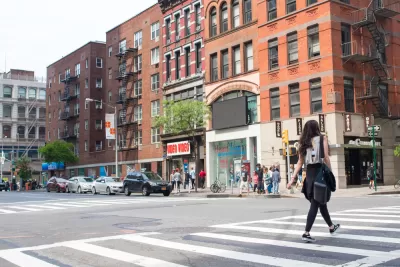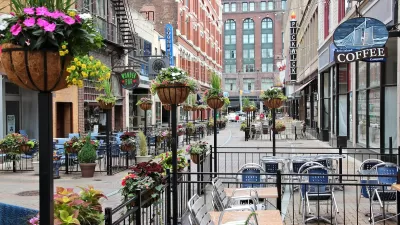New research out of the University of Virginia makes the case for walkable neighborhoods as incubators of economic mobility.

"New research from the University of Virginia finds children who are raised in walkable cities are more likely to climb the economic ladder, earning more than their parents did at similar points in their lives," reports Jane Kelly.
The study, "The Socioecological Psychology of Upward Mobility," was published in the journal American Psychologist.
According to the study, feelings of connectedness are a predictor of upward mobility. Nicholas Buttrick, one of the authors of the study, is quoted in the article: "We also find that if you live in a walkable city, you feel like you belong," Buttrick said. "You feel like you have a community, and that feeling also predicts whether or not you’re going to be moving up the economic ladder."
The researchers are planning to shift their focus next to the upward mobility enabled by public transit—some evidence of that outcome is already available.
FULL STORY: LIVING IN WALKABLE CITIES PREDICTS SUCCESS OF ‘AMERICAN DREAM’

Study: Maui’s Plan to Convert Vacation Rentals to Long-Term Housing Could Cause Nearly $1 Billion Economic Loss
The plan would reduce visitor accommodation by 25,% resulting in 1,900 jobs lost.

North Texas Transit Leaders Tout Benefits of TOD for Growing Region
At a summit focused on transit-oriented development, policymakers discussed how North Texas’ expanded light rail system can serve as a tool for economic growth.

Why Should We Subsidize Public Transportation?
Many public transit agencies face financial stress due to rising costs, declining fare revenue, and declining subsidies. Transit advocates must provide a strong business case for increasing public transit funding.

How to Make US Trains Faster
Changes to boarding platforms and a switch to electric trains could improve U.S. passenger rail service without the added cost of high-speed rail.

Columbia’s Revitalized ‘Loop’ Is a Hub for Local Entrepreneurs
A focus on small businesses is helping a commercial corridor in Columbia, Missouri thrive.

Invasive Insect Threatens Minnesota’s Ash Forests
The Emerald Ash Borer is a rapidly spreading invasive pest threatening Minnesota’s ash trees, and homeowners are encouraged to plant diverse replacement species, avoid moving ash firewood, and monitor for signs of infestation.
Urban Design for Planners 1: Software Tools
This six-course series explores essential urban design concepts using open source software and equips planners with the tools they need to participate fully in the urban design process.
Planning for Universal Design
Learn the tools for implementing Universal Design in planning regulations.
City of Santa Clarita
Ascent Environmental
Institute for Housing and Urban Development Studies (IHS)
City of Grandview
Harvard GSD Executive Education
Toledo-Lucas County Plan Commissions
Salt Lake City
NYU Wagner Graduate School of Public Service





























